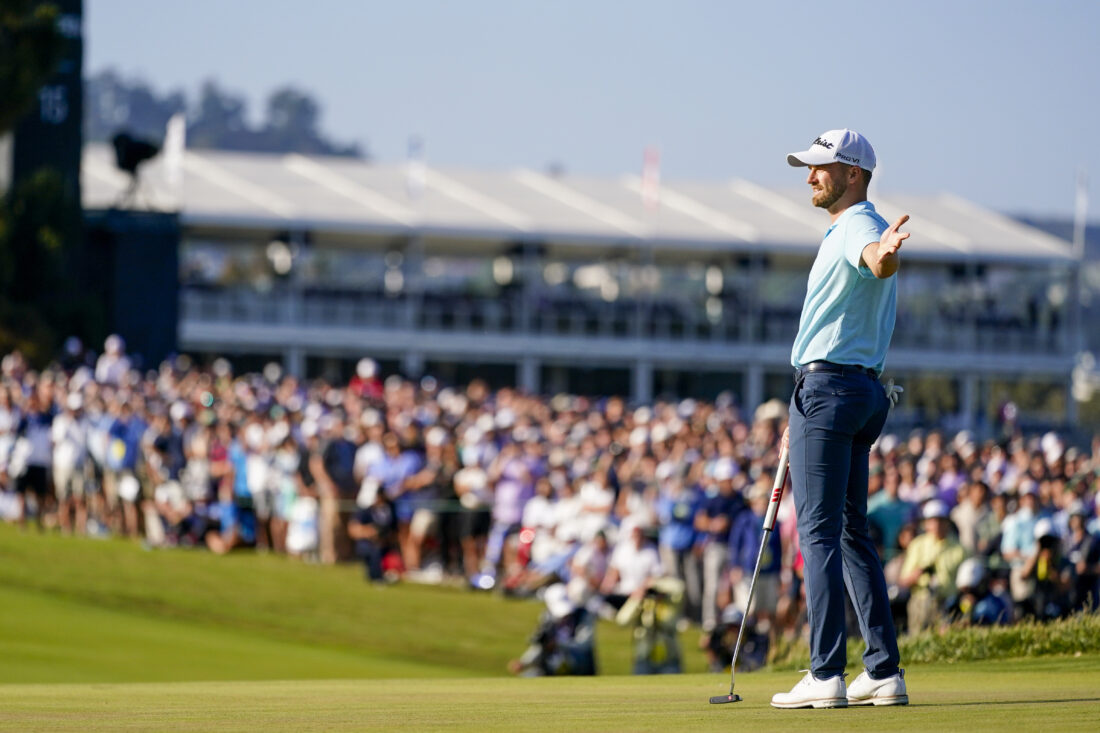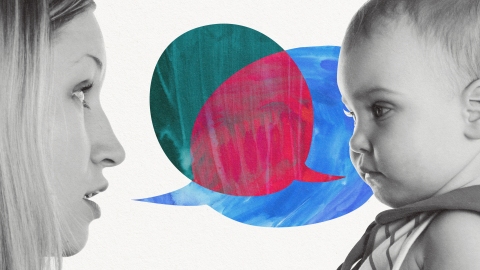
Wyndham Clark’s remarkable performance at the US Open
LOS ANGELES (AP) — Amidst the constellation of stars, Wyndham Clark took center stage and wrote his own compelling script at the U.S. Open.
In the spotlight, Wyndham Clark found himself in the presence of golf’s elite talents during the U.S. Open. Rory McIlroy, a prodigious golfer on the verge of ending his major title drought after nine years, stood before him. Alongside McIlroy in the final group was Rickie Fowler, a native of Southern California who had triumphantly emerged from a three-year slump and was poised to claim his first major victory.
Guided by the enduring words of his late mother, who always encouraged him to “Play big,” Clark possessed an unwavering belief in his ability to compete on any stage. And there was no grander stage than the U.S. Open, situated on the outskirts of Beverly Hills. It was there that Clark displayed remarkable composure, executing crucial saves and delivering a signature shot that granted him control. With nerves of steel, he fended off the relentless challenge from McIlroy, ultimately emerging as a major champion.
Reflecting on his triumph, Clark expressed, “I’ve always felt that I belonged on this grand stage. Even a couple of years ago, when my name wasn’t widely recognized, I knew deep down that I possessed the skills to play and compete against the world’s best players.” Closing the tournament with a composed even-par 70, he secured a one-shot victory over McIlroy.
Wyndham Clark’s outstanding performance at the U.S. Open in Los Angeles had the entire city captivated. In a star-studded field, he had his own narrative unfolding.
Sharing the final group with him were two formidable opponents. Rory McIlroy, a prodigious talent in golf, seemed determined to break free from his nine-year major championship drought. Alongside McIlroy was Rickie Fowler, a native of Southern California who had recently emerged from a three-year slump and was poised to secure his first major victory.
Clark, driven by the words of his late mother, who always encouraged him to “Play big,” carried a deep belief in his ability to compete on any stage. And what better stage than the U.S. Open, set on the outskirts of Beverly Hills? It was there that Clark showcased his resilience, executing crucial saves and delivering a signature shot that granted him control over the game. With unwavering nerves, he held off McIlroy’s relentless pursuit and emerged as a major champion.
Reflecting on his remarkable victory, Clark shared his confidence, stating, “I have always felt like I belonged on this grand stage. Even a couple of years ago, when I was relatively unknown, I had the conviction that I could play and compete against the world’s best players.” He sealed his triumph with an impressive even-par 70 in the final round, securing a one-shot victory over McIlroy.
This victory came only in Clark’s seventh appearance in a major tournament, surpassing his previous best performance of a tie for 75th place. Just six weeks prior, he had claimed his first PGA Tour title at Quail Hollow. Clark expressed his astonishment at how quickly his success had unfolded, highlighting his growth as a player. “I genuinely believe that I am one of the best players in the world,” he asserted. “This win just reinforces what I have always believed could happen.”
The climactic moment arrived as Clark faced two crucial putts from 60 feet on the 18th hole at Los Angeles Country Club. With determination, he rolled the ball to within a foot, and with a triumphant fist pump, he celebrated the near-perfect shot. Tapping in for an easy par, it was a fitting end to a day filled with intense challenges.
Left in Clark’s wake were renowned players, including Scottie Scheffler, the top-ranked golfer in the world, and British Open champion Cameron Smith. Even Fowler, who had played in the final group of a major on two previous occasions, couldn’t keep up with Clark’s extraordinary performance. As Clark allowed his emotions to surge, he raised his face to the heavens, tears streaming down his cheeks, and covered his face with his cap, overcome with joy and gratitude.
A decade ago, Clark had contemplated leaving the sport after grappling with the loss of his mother, Lise, to breast cancer. She had been his pillar of support during both good and challenging times. Throughout the week, Clark carried his mother in his thoughts, with various reminders of her presence in Los Angeles. He revealed, “People have approached me, showing pictures of my mom from her time in her 20s and 30s when she lived here. So, it had a special meaning for me being here in LA. My parents got married at Riviera Country Club, and I have a connection to this area.”
While Clark yearned for his mother’s presence to celebrate their shared triumph, he took solace in knowing that she would be proud of his achievements.
On the other hand, McIlroy experienced another bout of disappointment in his ongoing pursuit to end his nine-year major drought.
Wyndham Clark’s opening birdie gave him a promising start, but he couldn’t replicate that success for the remainder of the round. On the other hand, Rory McIlroy played a final round that usually proves victorious in a U.S. Open, with 16 pars and only one bogey. However, this time it wasn’t enough. Despite Clark showing signs of faltering during the challenging closing stretch, McIlroy struggled to find fairways and failed to give himself reasonable opportunities for birdies.
This situation mirrored McIlroy’s experience at St. Andrews during last year’s British Open when he consistently hit the greens but struggled to sink putts. Consequently, he will face further inquiries about when he might secure his next major victory.
Reflecting on his performance, McIlroy expressed his determination, saying, “When I do eventually win my next major, it will be incredibly satisfying. I would endure a hundred Sundays like this if it meant getting my hands on another major championship.”
Scottie Scheffler’s hopes were dashed as he missed too many putts early on the back nine and couldn’t rely on assistance from Clark or McIlroy, which never materialized. He finished third, carding a 70 in the final round, just a month after a runner-up finish in the PGA Championship.
Rickie Fowler, despite setting a U.S. Open record with 23 birdies, found himself in a familiar pattern that has plagued him in numerous majors—struggling from the outset. He stumbled with three bogeys in the opening seven holes and failed to make up ground, ultimately posting a 75.
In a day dominated by Wyndham Clark, his display of composure and unwavering self-belief, combined with his exceptional short game and an unforgettable fairway metal shot, stole the show.
Already holding a two-shot lead, Clark stood just a yard away from an effortless birdie on the par-5 eighth hole when his approach shot landed on a steep bank of the barranca to the left. With limited visibility of his golf ball, Clark took a calculated swing, but the ball only managed to advance a few inches deeper into thick grass.
Undeterred, he struck the ball once more, this time sending it over the green and onto a firm and intimidating putting surface, measuring 70 feet away. Clark then executed a masterful chip, guiding the ball to within 3 feet of the hole, ultimately saving himself with a bogey.
“That up-and-down was the pivotal moment of the tournament,” Clark reflected.
The ensuing holes showcased more moments of brilliance from Clark. On the par-3 ninth, he faced a delicate chip from the bank of a bunker, deftly utilizing the slope to his advantage, guiding the ball within 7 feet for another impressive save. Additionally, he executed a precise pitch from a challenging lie left of the 11th green, leaving the ball just 4 feet from the hole to secure a crucial par.
However, the defining shot came on the par-5 14th. Clark confidently struck a fairway metal from a remarkable distance of 282 yards, landing the ball 20 feet from the hole, setting up a two-putt birdie that extended his lead to three shots with only four holes remaining.
Yet, Clark experienced a brief stumble on the par-3 15th, registering his lone bogey of the day. This was followed by finding a bunker to the left of the 16th fairway, causing him to express frustration by tapping his putter in disappointment after missing a 7-foot par putt. With his lead reduced to just one shot, Clark needed to respond.
On the 17th hole, faced with a difficult situation left of the green, Clark showcased his resilience by executing a precise up-and-down to maintain his slender lead.
The USGA made a unique decision to allow a multitude of fans to encircle the fairway leading up to the 18th green, as the scarcity of grandstands created an expansive theater for the culmination of Clark’s remarkable performance.
Rickie Fowler, still in pursuit of his maiden major victory, made his way back to the 18th green to embrace Clark in a heartfelt hug.
Upon reuniting, Fowler conveyed his support and reassurance, stating, “I returned there and simply said, ‘Your mom was with you. She would be exceedingly proud.'”
With a final score of 10-under 270, Clark not only secured a well-deserved triumph but also earned a substantial prize of $3.6 million, marking his second such monetary reward in the past six weeks. Moreover, this victory propels him to the No. 2 position in the Ryder Cup standings.
Cameron Smith produced an impressive final round of 67, securing a fourth-place finish. Meanwhile, Tommy Fleetwood etched his name in the record books as the first player to register two rounds of 63 in the U.S. Open, ultimately finishing in a tie for fifth place alongside Fowler and Min Woo Lee, both of whom carded a final round of 67. Fleetwood had previously accomplished the feat with a final round of 63 at Shinnecock Hills in 2018.






